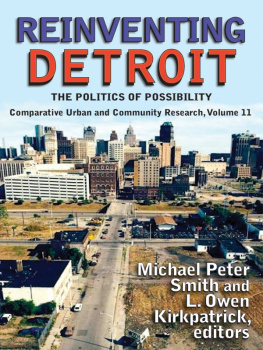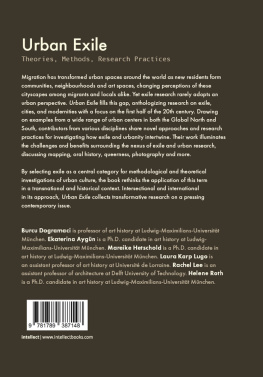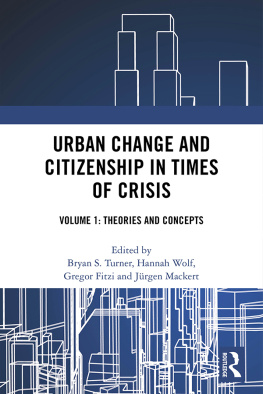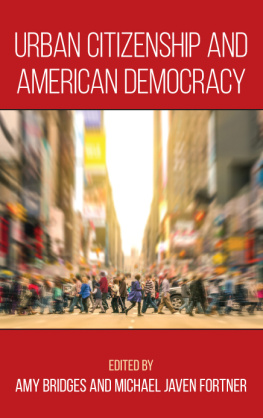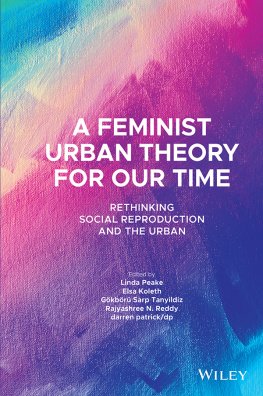Published 2017 by Routledge
2 Park Square, Milton Park, Abingdon, Oxon OX14 4RN
711 Third Avenue, New York, NY 10017, USA
Routledge is an imprint of the Taylor & Franc is Group, an informa business
Copyright 2017 by Taylor & Francis.
All rights reserved. No part of this book may be reprinted or reproduced or utilised in any form or by any electronic, mechanical, or other means, now known or hereafter invented, including photocopying and recording, or in any information storage or retrieval system, without permission in writing from the publishers.
Notice:
Product or corporate names may be trademarks or registered trademarks, and are used only for identification and explanation without intent to infringe.
Library of Congress Catalog Number: 2016027267
Library of Congress Cataloging-in-Publication Data
Names: Smith, Michael P., author
Title: Explorations in urban theory / Michael Peter Smith.
Description: New Brunswick : Transaction Publishers, [2017] | Includes index.
Identifiers: LCCN 2016027267 (print) | LCCN 2016039693 (ebook) |
ISBN 9781412864251 (hardcover) | ISBN 9781412863889
Subjects: LCSH: Sociology, Urban. | Urbanization.
Classification: LCC HT119.S6125 2017 (print) | LCC HT119 (ebook) |
DDC 307.76--dc23
LC record available at https://lccn.loc.gov/2016027267
ISBN 13: 978-1-4128-6425-1 (hbk)
Acknowledgments
I wish to thank the publishers and journals listed below for granting me their permission to reprint the original source of the following publications:
Social Theory and Social Reality: A Critique, in Michael Peter Smith, The City and Social Theory. Oxford: Blackwell, 1980, , pp. 170234. Copyright: St. Martins Press, 1979, First published in U.K. by Basil Blackwell, 1980. Reprinted by permission of St. Martins Press and Wiley Global Permissions.
Structural Marxist Urban Theory: Class Power, The State, and Urban Crisis, in Michael Peter Smith, City, State, and Market. Oxford and New York: Basil Blackwell, 1988, Paperback Edition, 1991, , pp. 6286, along with the references cited in the chapter. Copyright: Michael Peter Smith, 1988. Reprinted by permission of Wiley Global Permissions.
Urban Theory Reconsidered: Production, Reproduction, and Collective Action, in M. P. Smith and J. R. Feagin, eds., The Capitalist City: Global Restructuring and Community Politics. Oxford: Basil Blackwell, 1987, , pp. 87110. Coauthored by Michael Peter Smith and Richard Tardanico. Copyright: Basil Blackwell, Ltd., 1987. Reprinted by permission of Wiley Global Permissions.
Postmodernism, Urban Ethnography, and the New Social Space of Ethnic Identity, Theory and Society (1992), Vol. 12, No. 4: 493531.
Transnationalism and the City, in R. A. Beauregard and S. Body-Gendrot, eds., The Urban Moment: Cosmopolitan Essays on the Late 20th Century City, Sage: Thousand Oaks, London, and New Delhi, 1999: 119139.
Can You Imagine? Transnational Migration and the Globalization of Grassroots Politics, Social Text, Vol. 39 (Summer 1994): 1533. Copyright 1994, Duke University Press. All rights reserved. Republished by permission of the present publisher, Duke University Press. www.dukeupress.edu
Transnational Urbanism Revisited, Journal of Ethnic and Migration Studies (2005), Vol. 31, No.2 (March): 235244, Reprinted by permission of the Taylor Francis Group Ltd.
Transnationalism, the State, and the Extraterritorial Citizen, Politics & Society (2003), Vol. 31, No. 4 (December): 467502, Copyright 2003, Sage Publications.
The Two Faces of Transnational Citizenship, Ethnic and Racial Studies (2007), Vol. 30, No. 6 (November): 10961116. Reprinted by permission of the Taylor & Francis Group Ltd.
Power in Place/Places of Power: Contextualizing Transnational Research, City & Society (2005), Vol. XVII, No. 1: 534. Republished by permission of the American Anthropological Association and the University of California Press.
The Global Diffusion of Public Policy: Power Structures and Democratic Accountability, By Michael Peter Smith, Territory, Politics, Governance, Vol. 12: 118131. Journals website: www.tandfonline.com
I wish to acknowledge Transaction Publishers for its support in the development of this book. Andrew McIntosh, Transactions senior editor, offered helpful and insightful editorial advice. Communications and IT Manager Jeffrey Stetz, provided helpful technical advice and thoughtful comments on the management of permissions. My special thanks go out to Mary Curtis, the president of Transaction Publishers, for her willingness to undertake this book. For me, this project has been an exploration not just in urban theorizing, but also in critical self-awareness.
Many sources of intellectual engagement along the way are remembered for their influences on my theoretical journey. Not least among these are the coauthors of various joint works discussed in the opening and closing chapters of this book. I am grateful to my colleague and intellectual companion Fred Block, Research Professor of Sociology at the University of California at Davis, whose willingness to think about and comment on the twists and turns involved in my exploration are greatly appreciated and have made the final product better.
Finally to my wife Pat, to whom this book is dedicatedI love you more than you may realize and owe you even more than that.
1
Explorations in Urban Theory:
A Critical Overview
Cities throughout history have been made, reimagined, and transformed through the political interplay of capital flows, state policies, and the complex initiatives of both settled and mobile populations. Expressed in terms of human agency, cities are made and changed by the practices of powerful sets of actors including: diverse land-based business interests and developers and various other commercial, industrial, and postindustrial business firms; the actions and policies of state-centered actors, especially agents of the local state; and the sociospatial practices of neighborhood residents, immigrants, and transnational migrant networks across nations, regions, and localities. The interplay of these driving forces has occupied attention in urban social theory and research for over three decades.
Methodologically and epistemologically, most urban theorists have found it necessary, when thinking theoretically about urban change, to embed their changing conceptualizations of the urban, political-economic, and sociocultural transformations and the voices of neighborhood activists and social movement actors within a decidedly interdisciplinary frame of reference encompassing urban sociology, politics, anthropology, geography, history, and planning. My own interdisciplinary ideas, theories, concepts, and modes of gathering evidence on such urban questions are brought together in this book. They span the long period from 1979 to 2015 and represent a sustained effort to hold a mirror up to the theoretical literature in urban studies in order to consider the changing strengths, and, more often, the weaknesses, that I have seen in that mirror.


